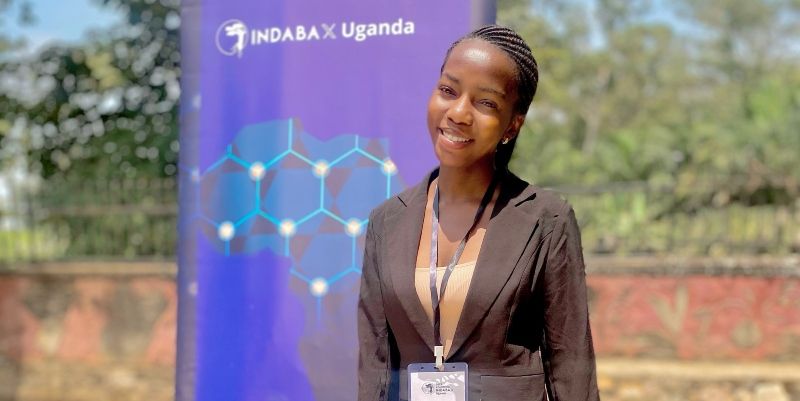
African students have spoken about a “profoundly impactful” conference they were able to attend thanks to University of Leeds funding.
Over 100 students with an interest in data science and machine learning were given travel grants to attend events at a week-long conference in Kampala, Uganda.
Deep Learning IndabaX Uganda was organised by the University of Leeds and Deep Learning Indaba – a group which aims to spread knowledge and help more people across Africa to contribute to machine learning and artificial intelligence (AI) conversations.
“Attending the IndabaX Uganda conference opened doors for me in ways that have greatly expanded my academic and professional horizons.
More than 300 people from across the African continent attended, including Namutebi Esther, a third-year Computer Science student at Kabale University, Uganda and a member of the IndabaX Kabale University Club. She said the opportunity to attend the conference was “incredibly impactful”.
“Without the funding, I would not have been able to attend the event, which provided me with invaluable experiences and connections that would have been impossible to gain otherwise. Attending the IndabaX Uganda conference opened doors for me in ways that have greatly expanded my academic and professional horizons,” she added.
Namutebi, who was a keynote speaker presenting her project on ‘Predictive Model for Drug Resistance in HIV from Genetic Data’, said she learned about new research areas such as astrophysics and ecology.
A platform for collaboration
“The knowledge and skills I gained from this event will undoubtedly benefit me in the future,” said Namutebi.
“The networking opportunities and exposure to cutting-edge research have enriched my understanding and equipped me with new tools to apply in my studies and future career. I feel more confident and motivated to explore interdisciplinary applications of AI, particularly in fields like health, astrophysics, and ecology.
“These events provide a unique platform for hands-on learning, collaboration, and inspiration that can profoundly impact one's career and academic journey. I am incredibly grateful for the experience and look forward to applying what I’ve learned to make a meaningful contribution to the field.”
"Attending was a pivotal moment in my academic and professional journey.
Another student who attended, Jovia Nakazibwe, said the event “profoundly impacted my academic and professional journey”.
Jovia added: “Without funding, attending this event would have been challenging. The support enabled me to engage with renowned experts and like-minded individuals, broadening my perspectives on AI's transformative potential.
“I wholeheartedly recommend attending events like IndabaX Uganda to students and professionals interested in AI's transformative potential. Attending was a pivotal moment in my academic and professional journey.”
Global challenges
The event was grown out of the Leeds-Africa Hub for Data Science & Artificial Intelligence, a project designed to connect Leeds researchers with those working in artificial intelligence and machine learning across Africa, to address global challenges.
Sessions covering ecology and astrophysics were delivered by University of Leeds researchers and recent PhD graduates who now work in Chile and Germany.
Academics from the University of Leeds won investment from the International Strategy Fund which they used to build relationships with colleagues working in countries across the African continent including South Africa, Uganda and Kenya. This began with a kick-off conference at the University of Pretoria’s Future Africa Campus in October 2023, organised through the Leeds-Pretoria strategic partnership.
International relationships
Professor Hai Sui Yu, Provost and Deputy Vice-Chancellor at the University of Leeds, said: “Our relationships with universities across the world are benefiting students in many countries, and they will put these experiences and what they learn into practice in their future careers.
“We recently hosted an inaugural International Partners Conference at the University, which was a key opportunity to build further connections with delegates. I hope it will help lead to more excellent experiences for students such as Deep Learning IndabaX.”
Professor Richard Mann, Professor of Mathematical Ecology & Evolution at the University of Leeds, said: “Our goal is to build and sustain partnerships with African researchers and institutions. The African continent has huge potential in machine learning and AI, which can support economic development and be applied to problems of importance to African communities.
“We are proud to support that potential, connecting academics in Leeds with partners across Africa and laying the foundation for successful future collaborations.”
The International Strategy Fund (ISF) is a major University investment. Supporting the International Strategy, the ISF represents £7 million over five years, enabling academic colleagues to engage in international collaboration.
Further information
Image credit: Namutebi Esther
For further information, please contact corporate communications officer Becky Pascoe on r.pascoe@leeds.ac.uk
You can contact the organisers of the Hub at leeds-africa-hub@leeds.ac.uk